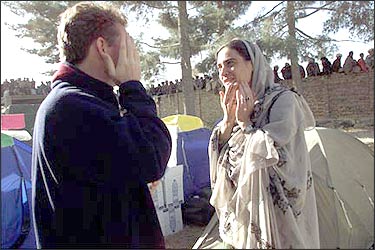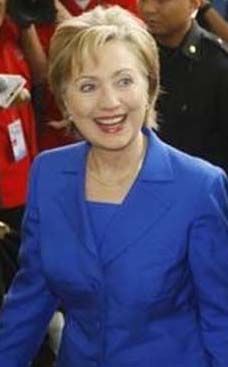
The problem in Afghanistan, according to Chayes, is that following the ouster of the Taliban in 2001, the United States returned to power the same warlords whose corrupt governance had led to the rise of the Taliban in the first place. The key is to replace cruel and corrupt governors, sub-governors, police chiefs and others with officials who do not mistreat the people. U.S. forces have succeeded in reforming the Afghan military, Chayes said, and the army may be the most well-respected institution in the nation. The United States needs to work at the local level to achieve the same change among civilian officials. She said more U.S. and NATO troops in Afghanistan will be useful if they work at the local level to protect populations and foster development. With more troops present, civilian casualties would probably decline, she said, because the military would be less reliant on air power and would be better able to carry out its mission of protection. Morocco RPCV Sarah Chayes has made a home in Kandahar, Afghanistan, became fluent in Pashto, one of the main Afghan languages, and devoted her energies to rebuilding a country gutted by two decades of war.
Sarah Chayes spoke about her hopes that the Obama administration might seize this moment to retrieve the chance for peace and stability in Afghanistan
Negotiate Peace
Published: March 11, 2009
President Obama has held out the possibility of negotiating with elements of the Taliban in Afghanistan as a way to quash the insurgency that has become an increasing threat to the nation.
At the same time the Obama administration has sought to lower expectations about what might be achieved in Afghanistan, even as Obama has ordered a build-up of troops there. Obama has also resorted to some common myths about Afghanistan as he tries to explain this complex situation.
Sarah Chayes, a former journalist who has been working in Afghanistan since 2002 to help the nation rebuild, spoke in Middlebury last week about some of those myths. She also spoke about her hopes that the Obama administration might seize this moment to retrieve the chance for peace and stability in Afghanistan.
One of the myths challenged by Chayes was that because Afghanistan is a tribal society, fractious and hard to unify, the job of forging a cohesive whole faces inherent difficulties. This is a variation of the myth that paralyzed the United States for too long when Yugoslavia was falling apart and people were talking about the ancient blood feuds among different Yugoslav nationalities.
As Chayes noted, most Afghans have more than one identity. Afghans may be Pashtun or Tajik, and they may be loyal to a particular tribe within those nationalities, but they also identify themselves as Afghan, and they long for a stable central government. Tribalism emerges when the center weakens; it is not the cause of the weakening.
Chayes also argued that the Taliban is not a home-grown insurgency. Rather, the conflict is an invasion by proxy by Pakistan, which arms and funds Taliban fighters, using some of the $1 billion in annual military aid from the United States. Some Taliban fighters are local men who are intimidated into joining or who are disaffected by the corruption of the local Afghan government. But the Taliban would not be possible without the support of Pakistan.
The problem in Afghanistan, according to Chayes, is that following the ouster of the Taliban in 2001, the United States returned to power the same warlords whose corrupt governance had led to the rise of the Taliban in the first place. The key is to replace cruel and corrupt governors, sub-governors, police chiefs and others with officials who do not mistreat the people.
U.S. forces have succeeded in reforming the Afghan military, Chayes said, and the army may be the most well-respected institution in the nation. The United States needs to work at the local level to achieve the same change among civilian officials.
She said more U.S. and NATO troops in Afghanistan will be useful if they work at the local level to protect populations and foster development. With more troops present, civilian casualties would probably decline, she said, because the military would be less reliant on air power and would be better able to carry out its mission of protection.
Chayes' analysis comes from deep experience of the country. She speaks Pashtun and has become so well-trusted by Afghans that she has become a member of a local village council in the conservative region of Kandahar. She also helps train members of the U.S. military.
She said members of the Obama administration are voracious in seeking knowledge of Afghanistan as they seek to chart a new course. The Afghan people are also hopeful, though it is discouraging to them when they hear Obama trying to lower expectations.
The Afghans experienced great joy when the United States expelled the Taliban in 2001, and they don't want to become subject to the Taliban's barbaric rule again. The Taliban thrive on corruption and chaos, and the best way to fight them is to help the Afghans govern themselves. Afghanistan was never a modern nation, but it was not always a place of anarchy. The Afghan people deserve peace, and the United States, which has had a major hand in its wars over the last 30 years, has the responsibility to help them achieve it.












